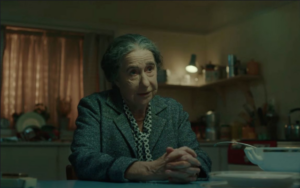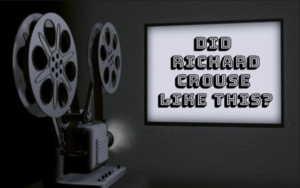GOLDA: 3 STARS. “feels like part two of three of the Golda Meir story.”
 “Golda,” a new biopic of Israeli prime minister Golda Meir is not a cradle to grave look at the life of the first women in the world to serve as a head of government in a democratic country. Instead, the film, now playing in theatres, focuses on the eighteen days of the Yom Kippur War in October 1973.
“Golda,” a new biopic of Israeli prime minister Golda Meir is not a cradle to grave look at the life of the first women in the world to serve as a head of government in a democratic country. Instead, the film, now playing in theatres, focuses on the eighteen days of the Yom Kippur War in October 1973.
Hidden under an inch or two of make-up, Helen Mirren plays the chain-smoking, seventy-five-year-old Meir with equal parts fragility and steeliness. Confronted with the news that Syrian forces are gathering on the Golan Heights, she convenes a military consultation with Mossad chief Zvi Zamir (Rotem Keinan). Ignoring his warnings of imminent invasion, she approves full-scale mobilization but rejects a preemptive strike, fearing the perception of warmongering would affect Israel’s access to foreign aid and military support from their allies, especially the United States.
My gut told me that war was coming and I ignored it,” she says. “I should have mobilized that night. All those boys who died, I will carry the pain of that to my grave.”
Told primarily in flashbacks— Israeli director Guy Nattiv uses Meir’s testimony to the Agranat Commission into the failings of the Israel Defense Forces in the prelude to the war as a framing device—“Golda” is actually the story of two battles, the Yom Kippur War against Egypt, Syria, and Jordan and Meir’s struggle with cancer.
Narrowing the film down to the Yom Kippur War allows for a focused look at those events but feels like part two of three of the Golda Meir story. A life of the magnitude and influence of Meir’s deserves and requires historical context. Watching the truncated story of “Golda” I found myself wishing for a more detailed account à la “The Crown,” but without the soapy elements.
The casting of Mirren was controversial—critics said an Israeli or Jewish actor should have been hired to play Israel’s most important female figure—but in Meir’s more intimate scenes, Mirren dives deep to portray the character’s many facets. Her eyes moisten at the reports of the horrors of war, she is resolute as the only woman in the room and, surprisingly, even humorous.
The film works best in Mirren’s scenes with Henry Kissinger (Liev Schreiber) and her assistant Lou Kaddar (Camille Cottin). Her cat-and-mouse with United States Secretary of State Kissinger is far more playful than you might imagine.
“I am first an American, second a secretary of state, third a Jew,” says Kissinger. “In this country,” Meir replies, “we read from right to left.”
The relationship with Kaddar is grounded in respect and trust, and in the little moments, like when she solicitously takes a cigarette out of Meir’s mouth as she is undergoing cancer radiation therapy.
“Golda” isn’t the definitive telling of Meir’s story. It feels a little too stage bound, a little too condensed, but the collective effect of Mirren’s intimate moments and the sound design by Niv Adiri that brings the battlefield to Meir’s war room, make “Golda” an interesting, if flawed, retelling of one of the seminal events of the 1970s.








